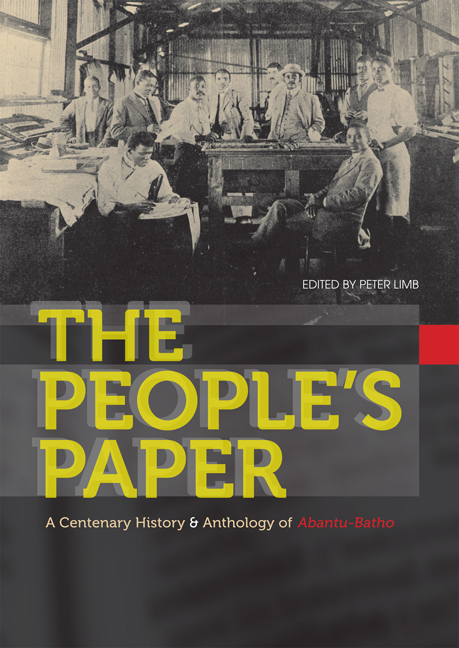PART II - Anthology
Published online by Cambridge University Press: 21 April 2018
Summary
INTRODUCTION
Part II comprises texts from Abantu-Batho in the form of articles, editorials and letters drawn from extant issues, fragments, translations in archives, or reprints in other newspapers or books. The narrow Abantu-Batho archive restricted scope, but for those years where more issues are available, our selection criteria seek a thematic balance across political, intellectual, economic, social and cultural history, biography, gender, class, and region. Despite the very limited and scattered archive we have been able to include at least one piece from each year of publication.
The sources are chiefly library or archival holdings, notably the extensive run between 1930 and 1931 in the National Library of South Africa (also microfilmed), the 1920 special issue in Durban and SOAS, 1928–29 issues in Atlanta and the Carter-Karis Collection, a range of issues and translations in the National Archives, Pretoria (especially Department of Justice and Director of Native Labour files), and the Swaziland National Archives, plus Rhodes House Library at the University of Oxford. We have given priority to unpublished items, but in the Bibliography readers can locate short extracts in contemporary newspapers and books, and selected reprints in compilations such as the Karis-Carter volumes, Outlook on a Century, and the Garvey Papers.
We keep notes to a minimum, as many persons and events are explained in Part I, but where necessary more obscure persons or events are annotated. Generally, we follow the language usage and spelling of the time. We have silently corrected some spelling or grammar, but kept this to a minimum to let readers appreciate the flavour of contemporary writing.
CONTENTS
1912
1. ‘The Municipalities and Natives’, Abantu-Batho, 23? October 1912
2. ‘Oppression of the Native & Coloured Races’, Abantu-Batho, December? 1912
3. ‘The Affairs of Swaziland’, Abantu-Batho, 25 December–12 February 1913
1913
4. ‘Native Women's Brave Stand’, Abantu-Batho, July? 1913
5. ‘The New Solicitor: Mr. R. W. Msimang’, Abantu-Batho, 5 July 1913
6. ‘An Ancient Couple: Suffering under the Lands Act’, Abantu-Batho, September 1913
- Type
- Chapter
- Information
- The People’s PaperA Centenary History & Anthology of Abantu-Batho, pp. 331 - 490Publisher: Wits University PressPrint publication year: 2012



